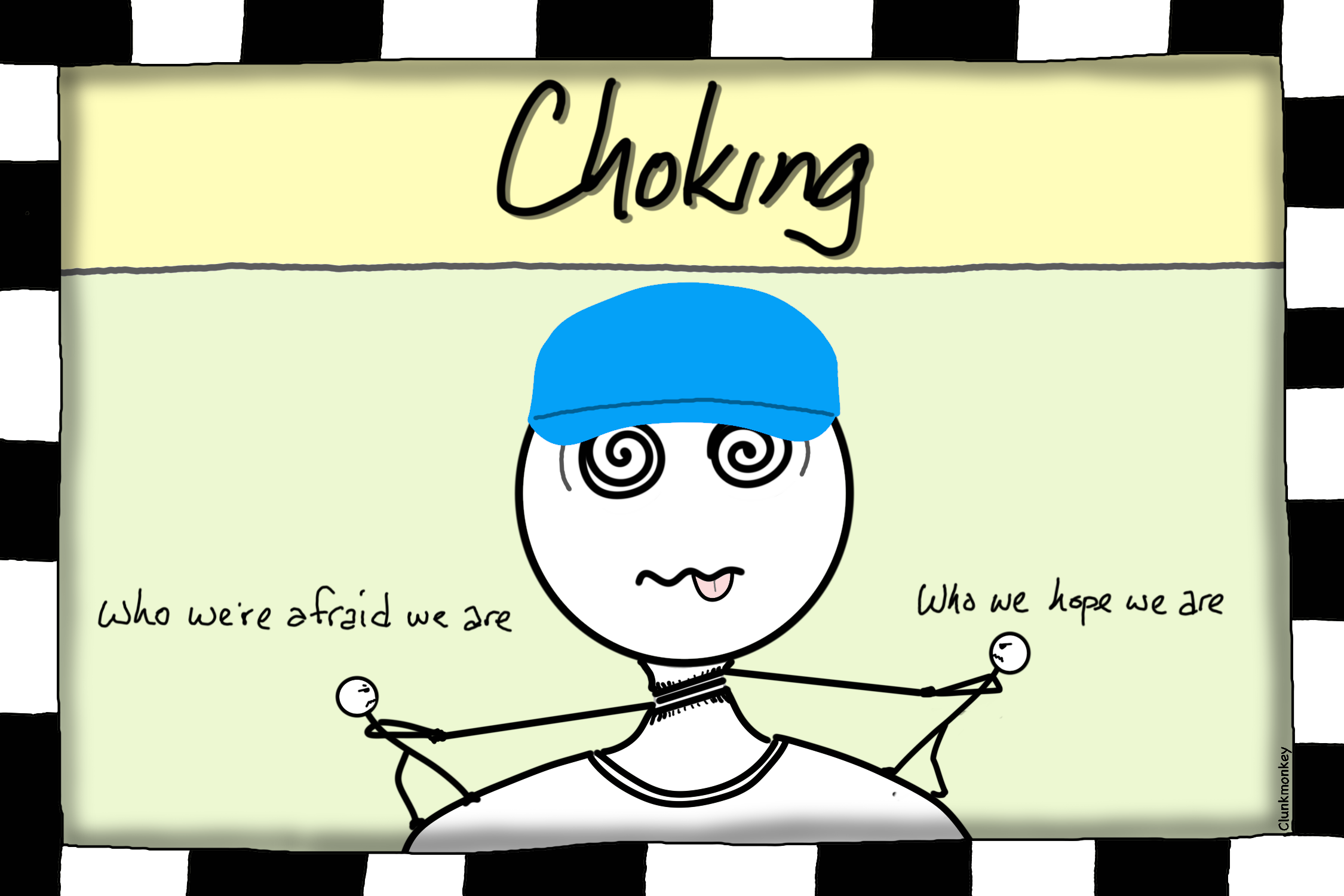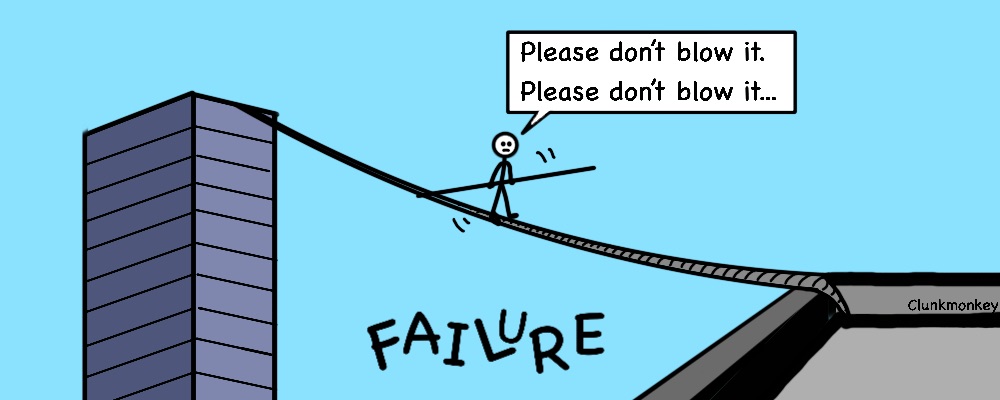It’s 5-4. You step up to serve for the set, or the match, and…
A speaker steps in front of an audience to deliver a talk they have delivered perfectly in practice, hundreds of times, and…
A golfer steps up to the tee box on the 18th hole. She’s one shot up, and…
Things fall apart.
What happened? People don’t just forget how to do their thing, do they?
Well… some think they do.
But the prevailing theory (among those who study their craft anyway) is re-investment theory.
Skills
The current thinking is that there are three stages to skills acquisition. In stage one we figure out what we need to do. This is called the cognitive stage. Stage two is the associative. Here we learn how to do what we need to do. There’s a lot of thinking and manual control going on in this stage. Accordingly our play is stiff and slow and mechanical… like a toy soldier. The final stage is automatic. And just as the name implies, the skills happen automatically… without thought.
Re-investment theory is the idea that we loop back into stage 2 when we get anxious… and become so slow and stiff and mechanical that it destroys our performance.
Solutions
Unsurprisingly, the solutions center on anxiety management.
Well, most do. Those who think their technique is failing them because they forget how to do their thing under pressure, return to the grindstone after every anxiety induced failure. Drilling… repeating… trying to re-force their forms into some form of memory.
And if you are one of those people… then you know that there is no shortage of “pros” willing to separate you from your money.
Meanwhile, the rest of the performance world is buying stress reduction techniques. Breathing. Meditation. Mindset. Also, stress seminars, mindfulness retreats, and classes on cognitive restructuring.
Another popular technique is to bring the stress of competition into your practices… or try to. (Now that I’m thinking about it… why not invert that… you know, bring the relaxed exploration of practice to competition?)
It’s like we don’t feel like we’re getting anywhere, unless we’re miserable. That’s weird… if you ever bother to think about it.
Anyway… all that stuff is just the tip of the iceberg. There are probably a million hacks… like imagining the audience naked. (Why is this supposed to help?) Clarifying your intentions. Thinking positive thoughts. Standing confidently. Finding your center. (Whatever that means.)
Then there’s medications (ie. beta blockers) And let’s not forget about “essential” oils. Also, marijuana is now legal…
It’s all blah and more blah. Because not one of these methods turns out to be an actual solution. You see, no matter how good the participant gets at the technique, they are still dealing with their anxiety.
Anxiety management is not anxiety elimination.
Imagine bringing you car to a mechanic because it doesn’t run properly, and instead of fixing you car, the mechanic gives you 12 hacks for living with a car that doesn’t run right… at the times you most need it to.
Welcome to the world of performance coaching.
Sincerity
Here is a TRUTH: whoever performs as a means to an end will feel fear. Because whenever there is the perception that something can be gained… something can be lost. And whenever one perceives that negative consequences are on the table, they will be afraid.
Therefor the root of anxiety is not found in a mindset, or self-confidence, or negative thoughts, or one’s “abusive” parents”. (Sorry to take that one off the table) Or even a fully clothed audience.
The root of anxiety is insincerity. Performing with the ulterior motive of “succeeding”.
You have been marinating in this success oriented culture for so long that you might dismiss that take as quickly as you would a homeless person warning you that the the end is near. (Although I’ll remind you that Diogenes was homeless, and not only did he have the eye of Athens top consort, he was the first person Alexander the Great asked to see upon his arrival to the city.)
But… give the idea a chance. Think about things you do solely for the sake of doing them. Reading, perhaps. Or maybe eating… talking with close friends and family… hiking… or biking… or fishing.
Feel anxious?
That’s because you’re after nothing but the experience itself.
Now imagine reading… for a grade; or eating… “right”; or trying to persuade close friends and family to do something important for you; or hiking or biking to beat someone’s time; or fishing… to impress a bunch of people.
See what I mean?
What’s really at stake?
Pretty much everyone simplifies performance anxiety to fear of failure. But I have seen some people fail in the most humiliating of ways… and remain unfazed. Sometimes even joining in the laughter caused by their own ineptitude.
These folks give evidence that what’s going on runs deeper… a lot deeper.
I think that what’s really at stake is how you will feel about yourself when the dust settles.
When we screw up and someone calls us a dumbshit… it’s not being called a dumbshit that bothers us. (Well… not entirely) What bothers us is that we consider the possibility that we might actually be a dumbshit. And that creates discord within us. Who we hope we are is threatened by who we are afraid we might be.
That scares the crap out of us.
But if you are 100% cool with who you are… if nothing (even being an occasional dumbshit) can shake your relationship with yourself, then nothing is at stake.
You are free to create. To Truly express yourself. And that right there… a person TRULY expressing who they are, is unfuckupable.
Therefor, the solution to performance anxiety… the way to ELIMINATE it (as opposed to just deal with it), is to discover what is keeping you from being 100% cool with yourself… as you are. You know, an occasional dumbshit who doesn’t have a Wimbledon title. (Was a little too autobiographical? I guess I’ve still got some work to do.)
Anyway, you’re welcome.
P.s. If you liked this… please share it. Or better yet, buy my book, The Art of Holding Serve. Or best of all, do both. Please.


